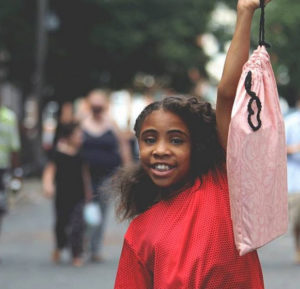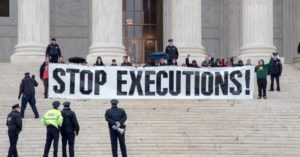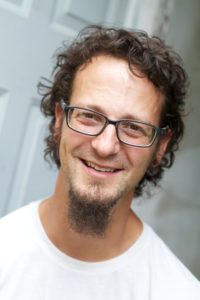 Shane Claiborne is a Christian activist, speaker and author, and a leading voice in a movement known as the New Monastics. He is one of the founding members of the intentional community The Simple Way in Philadelphia, Pennsylvania, where he lives with his wife, Katie Jo. Situated in a one of Philly’s poorest neighbourhoods, The Simple Way has inspired the formation of other vibrant faith communities around the world. Shane also heads up Red Letter Christians, a movement committed to living out the lifestyle prescribed by Jesus in the Gospels. His spiritual journey has taken him to many places, from working with Mother Teresa on the streets of Calcutta to the wealthy suburbs of Chicago where he served at the mega-church Willow Creek. As a peacemaker, he has spent time in some of the most troubled regions of our world.
Shane Claiborne is a Christian activist, speaker and author, and a leading voice in a movement known as the New Monastics. He is one of the founding members of the intentional community The Simple Way in Philadelphia, Pennsylvania, where he lives with his wife, Katie Jo. Situated in a one of Philly’s poorest neighbourhoods, The Simple Way has inspired the formation of other vibrant faith communities around the world. Shane also heads up Red Letter Christians, a movement committed to living out the lifestyle prescribed by Jesus in the Gospels. His spiritual journey has taken him to many places, from working with Mother Teresa on the streets of Calcutta to the wealthy suburbs of Chicago where he served at the mega-church Willow Creek. As a peacemaker, he has spent time in some of the most troubled regions of our world.
Shane was among a group of people recently arrested for protesting against the death penalty on the steps of the Supreme Court building in Washington. At the time of this interview, they were awaiting trial.
It was a great joy to spend some time chatting with Shane about what it means to live a life of radical, simple Christian obedience.
First, here are a few audio highlights from our conversation, with music by Robert Farmer: 4:32
Kolbe Times: We’d love to hear a little about your background. Where did you grow up?
Shane Claiborne: I grew up in East Tennessee, and had a real authentic spiritual encounter in middle school, and dedicated my life to Jesus. I’ve been on the journey ever since. I grew up Methodist, and John Wesley was one of the first voices that I came across in my faith. He said, “When I have any money, I get rid of it quickly, lest it find a way into my heart.” He knew the danger of how money can corrupt. He also said, “When I die, if I leave behind me ten pounds, you and all mankind may bear witness against me, that I have lived and died a thief and a robber”. He didn’t want to betray the poor, or betray Jesus.
That was a powerful voice in my early life. Wesley capped off the amount of money that he actually lived on at a very meager level – 30 pounds a year. And then when I look at St. Francis of Assisi and others, and particularly the message of Jesus, who talked about selling all that we have and giving it to the poor, and living life like the lilies and the sparrows – well, it’s so striking, and such a stark contrast to the world we live in.
Anyways, I was really fascinated with Jesus, but I kind of didn’t know what to think about the church. My youth pastor encouraged me to study at Eastern in Philadelphia, which is a Christian university, so I went to study there. I met some really great people who were pretty radical.
While I was there, a few of us students heard about a group of mostly homeless moms and their kids who were living in an abandoned Catholic church building in downtown Philly. The moms had hung a banner that said, “How can we worship a homeless man on Sunday, and ignore one on Monday?” It was like we had bumped right into the Franciscan spirit – “Repair my church, which is in ruins”. We started in that abandoned church building, and the whole experience was the spark that lit the fire for us. We got involved in the struggle for housing in that community, and The Simple Way community eventually flowed out of that experience. It was like a baptism into social justice.
Kolbe Times: You wrote that around that time you were on the lookout for someone who was a “real” Christian – someone who actually believed that Jesus meant the things he said. Tell us where your search led you.
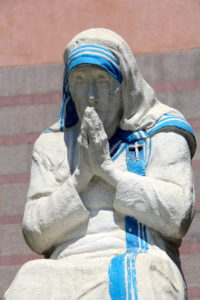 Shane Claiborne: I ended up in India, working with Mother Teresa and the Sisters for a few months. I worked in the orphanage in the morning, and in a Home for the Dying in the afternoon. I met a lot of really incredible people during that time, and Mother Teresa herself was a beautiful example of someone who was living the Gospel way of life. She used to say that our best sermon is our life – and she preached a good one.
Shane Claiborne: I ended up in India, working with Mother Teresa and the Sisters for a few months. I worked in the orphanage in the morning, and in a Home for the Dying in the afternoon. I met a lot of really incredible people during that time, and Mother Teresa herself was a beautiful example of someone who was living the Gospel way of life. She used to say that our best sermon is our life – and she preached a good one.
There were a lot of people like me helping out there, from all over the world. There was this one guy that I got to know who was from Germany. He said that when he read the Bible passage about Jesus encountering the rich young ruler, he said to himself, “That’s me.” So he took Jesus’ advice to heart and sold everything he had – and moved to India to help Mother Teresa. He was such a charming guy, and so free. He was a faithful volunteer at the Home for the Dying, living very simply off the money he’d gotten from selling everything he owned. He’d been there about ten years when I met him.
Kolbe Times: You also got to know a community of lepers outside Calcutta. That must have given you some rich insights.
Shane Claiborne: Yes, it was a really important experience for me. It felt like walking into a page right out of the Bible, and I started to see the Gospel with brand new eyes. I also started to understand that a lot of communities that are economically poor are community-rich…and vice versa.
When I got back to the U.S., I did an internship at the Willow Creek Community Church in Chicago for a year. Needless to say, when I went to their huge campus and walked into the food court in the atrium, I knew I was a long way from the leper colony! But somehow, that experience fit into my journey, too. After I graduated, I still wasn’t sure what I wanted to do, but there were a bunch of us that were dreaming about finding another way of doing life.
So, in 1997 a few of my friends and I pooled our money together, which wasn’t much – just a few thousand dollars – and bought a little row house in one of the poorest neighbourhoods of Pennsylvania, and moved in. It was just a few minutes from that abandoned church building where we had got to know the homeless moms and their kids. The whole thing just grew from there.
Thankfully we had some elders who walked alongside us and gave us good advice. We’ve learned a lot about community over the years – a lot of it from our own neighbours right here in Philly. We were, and still are, very inspired by the early church, and the way they shared everything. When we started our community, some of the early books we read were ones about St. Francis. We also read a lot of things by Jean Vanier and Henri Nouwen about the L’Arche communities, plus we were really fascinated by Dorothy Day and the Catholic Workers movement.
We decided that it was important that we don’t just “protest” – we wanted to “protestify”, or in other words, proclaim how things can be made right. Richard Rohr says that the best critique of what’s wrong is the practice of something better. That’s what we’re trying to discover, and demonstrate, and live out.
So we started this little intentional community in the house that a few of us had 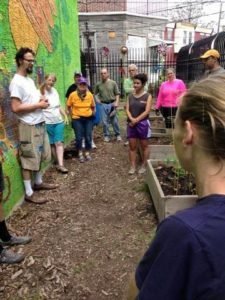 bought together – and over the past 20 years it’s become a village. We’ve got community gardens, and abandoned houses that we’ve turned into affordable housing. We’ve got after-school programs and we paint murals and we share food with people each week. I like to say that the Gospel is lived out of living rooms and around dinner tables. That’s what happened in the Book of Acts, and that’s what we try to live out in our own neighbourhood here.
bought together – and over the past 20 years it’s become a village. We’ve got community gardens, and abandoned houses that we’ve turned into affordable housing. We’ve got after-school programs and we paint murals and we share food with people each week. I like to say that the Gospel is lived out of living rooms and around dinner tables. That’s what happened in the Book of Acts, and that’s what we try to live out in our own neighbourhood here.
Kolbe Times: Why did you name your community The Simple Way?
Shane Claiborne: There were a few key influences at the start. Mother Teresa said that following Jesus is simple but that doesn’t mean it’s easy. We liked that, and we decided that our mission statement should be simple, too: “To love God and love people”.
 But, you know, Dorothy Day said that the love that really binds people together is not a sentimental love that you read about in fairy tales and storybooks – it’s the harsh and dreadful love that keeps you up at night! We appreciated that. And we try to stay true to something else that Mother Teresa said, “It is not how much we do, but how much love we put in the doing.” She also said that we might not all be able to do great things, but we can do small things with great love. That’s been at the centre and core of The Simple Way – trying to do small things with great love.
But, you know, Dorothy Day said that the love that really binds people together is not a sentimental love that you read about in fairy tales and storybooks – it’s the harsh and dreadful love that keeps you up at night! We appreciated that. And we try to stay true to something else that Mother Teresa said, “It is not how much we do, but how much love we put in the doing.” She also said that we might not all be able to do great things, but we can do small things with great love. That’s been at the centre and core of The Simple Way – trying to do small things with great love.
Kolbe Times: What were some of the issues you wrestled with at the start?
Shane Claiborne: Well, you know, sometimes I think we’re too quick to be a voice for the voiceless. But many people are not voiceless – they just aren’t being heard! And we need to help them be heard; help to amplify their own voices, and not speak for them.
I think of our early language – terms like ‘downward mobility’ and when we were struggling with what that really means. There’s this contrast, this duality, in the Gospel of the last becoming first and the first becoming last; the mighty cast from their thrones and the lowly lifted up; the mountains laid low, and the valleys raised up. So it seems like there is movement going both ways – some folks are called to downward mobility, and there is also a lifting up of people who have been stepped on and oppressed.
When it comes to how we talk about poverty, I love the image in Proverbs that says, “Give me neither poverty nor riches, but only the bread I need each day. For in my poverty I might be forced to steal, and in my riches I might forget my God.” We talk about a ‘theology of enough’ – this day our daily bread, where everybody has what they need. I think even to live in simplicity might look like poverty to some people, when you choose to stop accumulating more and more stuff. But when you go to the other side of the world and see that this is how a lot of the world lives – very simply…or in desperate poverty.
I think that we do want to commit to ending desperate poverty and suffering in the world, and one of the ways that we do that is choosing to align ourselves closer to the suffering in the world, and to ‘lean in’ to the places that other people are trying to move away from. That’s exactly what happened in Jesus. God puts skin on, and moves in among us. He is born a refugee, and dies on a cross.
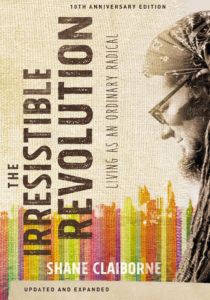 Kolbe Times: That brings to mind something in your book The Irresistible Revolution, a book that was transformative for so many people, including us. You wrote, “Jesus was not simply a missionary to the poor. He was poor.” And that’s the Jesus we follow – such a striking thought. Which brings me to your involvement with the Red Letter Christian movement that you co-founded with Dr. Tony Campolo, who was one of your teachers at Eastern. Tell us how that got started.
Kolbe Times: That brings to mind something in your book The Irresistible Revolution, a book that was transformative for so many people, including us. You wrote, “Jesus was not simply a missionary to the poor. He was poor.” And that’s the Jesus we follow – such a striking thought. Which brings me to your involvement with the Red Letter Christian movement that you co-founded with Dr. Tony Campolo, who was one of your teachers at Eastern. Tell us how that got started.
Shane Claiborne: Tony and I and some others were thinking about how a lot of us Christians unfortunately don’t reflect Jesus by our actions or what we’re known for, and we don’t really take the words of Jesus seriously. Gandhi once said that he loved Jesus…he just wished that the Christians were more like him. So that was the discussion behind it.
 And here’s the interesting story behind the name. A friend of ours was interviewed by a radio host down in Nashville, and the interviewer at one point was talking about how there were parts of the Bible that he found confusing and even troubling. But then he said that he always really liked the parts in red. He was talking about the words of Jesus that in some Bibles are highlighted in red. He said, “You guys seem to like the stuff in red, too. You should call yourself Red Letter Christians.” And somehow that name just stuck.
And here’s the interesting story behind the name. A friend of ours was interviewed by a radio host down in Nashville, and the interviewer at one point was talking about how there were parts of the Bible that he found confusing and even troubling. But then he said that he always really liked the parts in red. He was talking about the words of Jesus that in some Bibles are highlighted in red. He said, “You guys seem to like the stuff in red, too. You should call yourself Red Letter Christians.” And somehow that name just stuck.
It seems like we’ve moved away from being centered in Jesus. When that happens, we talk a lot about things that Jesus didn’t talk about – and we don’t talk about things that Jesus had a whole lot to say about. Red Letter Christianity is all about coming back to Jesus again. One of the neatest parts is that we’ve created a beautiful little community of speakers and writers on our website who are centered on Jesus. And we’re opening that up to churches and other communities now, too.
Kolbe Times: It’s so easy to get caught up in all the confusion and divisiveness that surrounds us right now, which can feel very destructive to our spirits. It seems that we need to take some time to rediscover our purpose, and simplify our focus.
Shane Claiborne: I agree. We need to put our main focus on trying to live in a way that truly reflects our faith, and ripples will just naturally follow out of that.
I heard someone say that God’s ways are not spread by force, but by fascination. Those Christians who have lived out their Christianity so beautifully have fascinated the world with God’s love. To quote Mother Teresa again, they give off the fragrance of Jesus by the way that they live. She’s a great example of that herself, as well as the current Pope. Unfortunately it seems that Christianity has become less and less fascinating to a lot of people, because so often our lifestyle doesn’t reflect the things we believe.
We need to ask ourselves questions like, “What does it really mean to hold our possessions with open hands?” and “How we can find the freedom that Jesus talks about?” St. Francis is an example of someone who asked himself those questions, and fascinated the world with his love and reckless abandonment of material things. He has so much relevance to our time, too – he was a conscientious objector to war, he had a love for the poor, he was an environmentalist…the list goes on.
Kolbe Times: Who else are some of your spiritual heroes?
Shane Claiborne: Martin Luther King, definitely. And I wrote a book called Follow Me to Freedom with John Perkins – John is a real hero of mine, too. His dad was a sharecropper, and his brother was killed in the civil rights movement. John is an incredible person, and a longtime leader in civil rights activism himself.
More recently I’ve loved the work of Bryan Stevenson. He’s a lawyer in Montgomery who is challenging the bias in the criminal justice system against minorities and the poor. Rev. William Barber from North Carolina is another very important voice in our world right now. And there are also a lot of local people here who inspire me that not many folks know about, like my 85 year old friend Sister Margaret McKenna, who is a member of the Medical Mission Sisters and who founded an addiction treatment center here in Philadelphia.
Phil Berrigan and Liz McAlister, who founded Jonah House in Baltimore and were in at the beginning of the Christian pacifist Plowshares movement, are people who lived out their faith in radical ways, and who have had a big influence on us, too. And Richard Rohr is a great friend and has been very influential in my own spirituality.
Kolbe Times: It seems like there’s a movement going on within the Church, and outside the Church – people examining how their beliefs and their actions line up, and who are determined to have more integrity in the way they live.
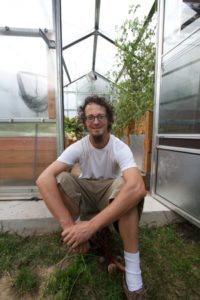 Shane Claiborne: Yes, I believe you’re right. I’ve been to a lot of conferences the past few years that all have a certain vibe, almost like therapy sessions for recovering Christians. But I think it’s about time we started to move on from post-evangelicalism. There comes a point when you have to quit reacting and start being pro-active, building something new. You can only “deconstruct” so long – eventually you need to start to travel on a more constructive path. I know lots of young teens that have never been to “Sunday School”, and they now lack a framework for their spirituality. We need to grow their discipleship and nurture their faith.
Shane Claiborne: Yes, I believe you’re right. I’ve been to a lot of conferences the past few years that all have a certain vibe, almost like therapy sessions for recovering Christians. But I think it’s about time we started to move on from post-evangelicalism. There comes a point when you have to quit reacting and start being pro-active, building something new. You can only “deconstruct” so long – eventually you need to start to travel on a more constructive path. I know lots of young teens that have never been to “Sunday School”, and they now lack a framework for their spirituality. We need to grow their discipleship and nurture their faith.
My friend Chris Haw, who is a really sharp theologian, wrote a book called From Willow Creek to Sacred Heart. It’s about his journey growing up in non-denominational evangelicalism to becoming Catholic. One of the metaphors that he uses is that for a while the emerging, non-denominational church felt like being in a kayak going down a wild spiritual river. He learned that in the long haul you’ve got to turn around and look back in order to move forward. He and I wrote a book together called Jesus for President: Politics for Ordinary Radicals.
As we start to learn from our past experiences and build something new, it gives me a lot of hope. I heard one of my friends telling someone, “If you like the Pope, you’ll really like Jesus.” It’s beautiful that Pope Francis is leading by example, doing what all of us should be doing, living out the Gospel by visiting refugees, washing the feet of people in prison, and speaking out against violence and unhealthy business practices.
Kolbe Times: Talk to us about your efforts to abolish the death penalty. Your latest book is called Executing Grace: How the Death Penalty Killed Jesus and Why It’s Killing Us. And on January 17 you were arrested, along with others, for protesting and holding up a banner that said “Stop Executions” on the steps of the Supreme Court building in Washington.
Shane Claiborne: Yes, it was an honour to be a part of that “holy mischief” with a group of courageous folks – people like Derek, who was wrongfully convicted, and SueZann, whose father was a murder victim, and Randy, whose brother was executed – and others who have connections with people who were murdered or who have been executed. We were there together to say that we stand against all violence. Violence is the problem, not the solution. It’s not like we’re anti-victim or anti-justice – it’s just that we can do better than killing to show that killing is wrong. We need to allow ourselves to imagine and explore other models, like restorative justice. I visited Rwanda in the aftermath of the horrific genocide there, and it has become a mirror to the world of what restorative justice and healing can look like, with amazing and very powerful stories of forgiveness and grace.
But yes, 18 of us were arrested on January 17 – and our trial begins on June 28 in Washington, D.C. We plan to use our trial to put the death penalty on trial.
You know, I spent a lot of my life on the other side of this issue – for the death penalty. I was convinced that it was ordained by God and had its roots in Scripture. But at the heart of this issue is the question of redemption. Is anybody beyond redemption?
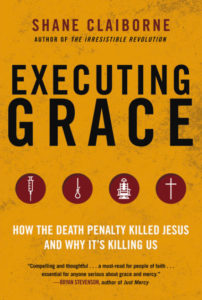 Then there’s a whole lot of other questions to unpack that unravel from that – for instance, how we can see that our racial history still affects the criminal justice system; who lives and who dies. And there are questions of innocence. How much do we trust the government with irreversible power over life and death? For every nine executions, we’ve had one exoneration. That’s not a very good track record. If for every ten planes that took off, one crashed – well, you’d probably stop flying.
Then there’s a whole lot of other questions to unpack that unravel from that – for instance, how we can see that our racial history still affects the criminal justice system; who lives and who dies. And there are questions of innocence. How much do we trust the government with irreversible power over life and death? For every nine executions, we’ve had one exoneration. That’s not a very good track record. If for every ten planes that took off, one crashed – well, you’d probably stop flying.
And you know, it’s a little different in Canada, but one thing that’s true here in the U.S. is that the death penalty wouldn’t stand a chance without Christians. We’ve been the theological backbone and the moral justification of the death penalty. Eighty five percent of executions in the last 40 years have happened in the Bible belt. That’s very troubling to me.
One of the things that I think is helpful is to have what a lot of Catholics have done so well, which is to have a consistent life ethic; pro-life from the womb to the tomb, and the movement of being “for life” not just being limited to abortion, and not being synonymous with pro-birth. We want to stand against that, because being pro-life should also shape how we think about gun violence and war and the environment and the death penalty and the movement for black lives and racial injustice and immigration and refugees. These are all issues of life and death, which I would love to see us more consistent on. What’s so problematic in the U.S. is that we have a two party system in which neither party or camp has a consistent ethic of life. But I think it’s one of the things we shouldn’t compromise on. We should continue to proclaim life across the board.
And having a consistent life ethic is really resonating with a lot of young folks. I read a recent poll that showed 80% of millennial Christians are against the death penalty. That’s encouraging. The end is in sight…and the real question is where Christians will be as we abolish the death penalty.
There’s been so many people like Sister Helen Prejean and Mother Teresa and Pope Francis who have been wonderful voices for life, and against the death penalty – against anything that’s squashing people’s lives and dignity.
Kolbe Times: Thank you so much for taking the time to share your stories and your thoughts with us. It’s been fascinating.
Shane Claiborne: It’s been really great talking with you, too. I enjoyed it a lot. You should come and visit us sometime if you’re ever in Philly!
This interview took place in mid-June 2017. On June 28, a two-day trial began as Shane Claiborne and 11 co-defendants went on trial for their January 17 protest action at the Supreme Court building in Washington. Each of the defendants had written a brief statement explaining why they were willing to go to jail to stand against the death penalty. As well, powerful testimony was elicited by four of the defendants about how the death penalty damages all those who encounter it.
All 12 were found guilty. They were sentenced to time already served, and ordered to pay a $200 fee to a fund for victims of crimes.
Shane wrote after the trial: “It is a strange thing to live in a country where it is legal to execute people, but it is not legal to hold a banner in front of our highest court. Nonetheless, I am very proud of what we did, and honoured to stand next to my co-defendants.”
Shane’s books include The Irresistible Revolution, Jesus for President, Red Letter Revolution, Common Prayer, Follow Me to Freedom, and Becoming the Answer to Our Prayers. He recently released a new version of The Irresistible Revolution, which includes updates on many of the original stories and events with fresh reflections. Shane’s latest book is Executing Grace: How the Death Penalty Killed Jesus and Why It’s Killing Us (June 2016).
Visit www.shaneclaiborne.com. You can also follow Shane on Facebook and Twitter.
For more great stories and resources, check out www.thesimpleway.org and www.redletterchristians.org.
Photos by Coe Burchfield; others courtesy of The Simple Way.



